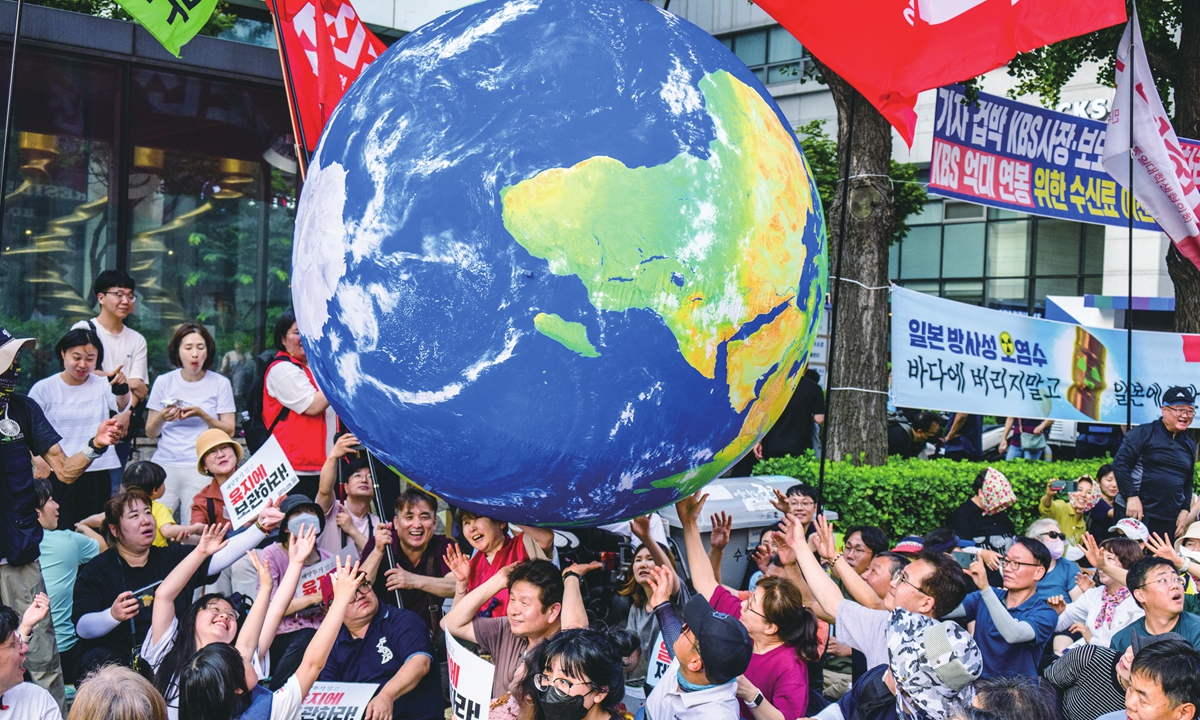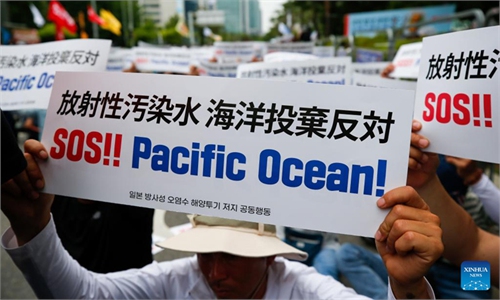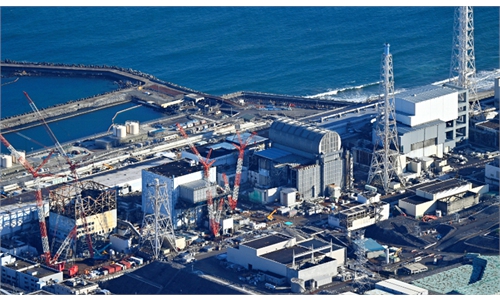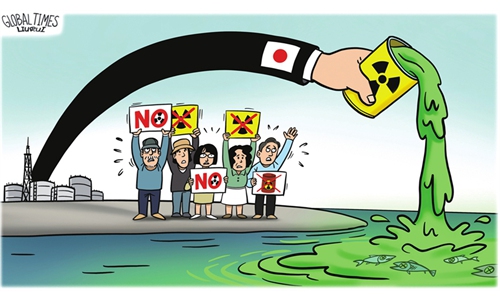Opposition mounts against Japan's plan to dump nuclear-contaminated wastewater
Stakeholders urged to make joint efforts to put on hold erroneous disposal

Lifting a miniature globe, activists gather in Seoul to protest against Japan's planned dumping of nuclear-contaminated wastewater from the Fukushima nuclear power plant on June 24, 2023. Photo: AFP
Opposition against Japan's plan to dump nuclear-contaminated wastewater from the crippled Fukushima nuclear power plant into the Pacific Ocean was mounting at home and abroad on Wednesday as Japan is reportedly to begin the dumping plan as early as August, bolstered by the IAEA's latest report to greenlight its plan.
China's Ministry of Ecology and Environment stated on Wednesday that it opposes Japan's plan to dump the nuclear-contaminated wastewater from Fukushima into the sea. The ministry said it has deployed environmental monitoring for marine radiation levels and will issue an early warning in time to effectively safeguard the interests of the country and public health in case of any abnormalities.
Prior to the statement from China's environmental authority, the Chinese Foreign Ministry and China Atomic Energy Authority (CAEA) also on Tuesday expounded China's firm opposition against Japan's dumping plan.
Stakeholders and the international community have been urged to take more concrete actions, including filing complaints to international agencies to politically pressure the Japanese government to revoke the erroneous plan.
The international community has paid close attention to Japan's dumping plan after the International Atomic Energy Agency (IAEA) claimed in its latest report on Tuesday that Japan's plan was "consistent with international safety standards."
Around 33,000 people from Fukushima, Iwate and Miyagi in Japan have signed a petition protesting the dumping of nuclear-contaminated wastewater into the ocean, making a total of 254,000 signatures collected in these places since 2022 urging the Japanese government to suspend the plan, Japan's Kyodo News reported.
Outside Japan, more people, especially those from Pacific countries, have poured dissatisfaction toward the IAEA report and criticism on Japan's extremely irresponsible plan. For example, many in Seoul, South Korea gathered Wednesday in the central Gwanghwamun square to protest Japan's dumping plan despite the IAEA's endorsement, South Korean media reported, noting that the protest has continued for weeks.
A survey conducted by the Global Times Research Center found that except for Japanese respondents, 42 percent of the respondents in 10 other countries the in Asia-Pacific preferred to "seek solutions of international consensus through international organizations such as the United Nations," 37 percent of them chose to "tighten the import control measures of aquatic products from relevant regions," and more than 30 percent of them said that "international scientific expedition vessels should be sent to inspect, monitor and supervise surrounding areas.
The main opposition Democratic Party in South Korea on Wednesday questioned the credibility of the IAEA report and said it was based on Tokyo-provided data and "was like something ordered by Japan." Some party members also held a rally against Japan's dumping plan at the National Assembly, Yonhap News reported.
Former Papua New Guinean prime minister Peter O'Neill told the Global Times on Wednesday that they are disappointed as Japan still wants to go ahead and dump the nuclear-contaminated water into the Pacific, but people are not convinced by the scientific reports that said Japan's plan was safe.
Japan owes an explanation to the international community and the Pacific. It should find other ways to deal with the problem, O'Neill said.
The Japanese government aims to use the IAEA report to dispel opposition to create a favorable environment to push its radioactive wastewater dumping plan, but it will be overwhelmed by fiercer opposition given the severity of the dumping plan, Liu Jiangyong, vice dean of the Institute of Modern International Relations at Tsinghua University, told the Global Times on Wednesday.
Liu said that the observation period for the impact of Japan's dumping plan should last at least for three decades and any health abnormalities to people in Japan's neighboring countries and marine lives in nearby waters could be linked to the dumping plan.
The Fukushima accident and the disposal of the nuclear-contaminated wastewater are challenges to humans' peaceful use of nuclear power, and Fukushima's severity may exceed the Chernobyl nuclear accident. Such an issue of shared concern of all humans should not be unilaterally decided by the Japanese government, Liu said.
Although the IAEA said that it will "have a continuous on-site presence and provide live online monitoring on its website from the discharge facility," its credibility and neutrality in dealing with Japan's irresponsible plan is challenged, some analysts said.
After the press conference in Tokyo on Tuesday, while being escorted to out of the room, IAEA Director General Rafael Mariano Grossi was questioned closely by a reporter on how to comment on reports alleging that the Japanese government made a political donation of more than 1 million euros ($1.10 million) to the IAEA. Grossi turned back and said "I didn't receive anything."
As the Japanese government has decided to arbitrarily push the dumping plan, analysts urged stakeholders to take concrete actions to protect their interests.
The Korea Federation of Environmental Movement, a nongovernmental organization (NGO), told the Global Times that they are mulling several ways to urge the Japanese government to revoke its plan, including rallying a global online petition to international organizations, including the UN, IAEA, the International Maritime Organization and sending letters to heads of states, such as the US and EU countries to express their concerns and impose political pressure on Japan.
The NGO also plans to file complaints to the UN Human Rights Council and urge governments in Pacific Rim countries to sue Japan at the International Court of Justice.
Analysts said that the international community can take various practical measures to impose pressure on the Japanese government, and the US and some Western countries should join to pressure Japan, as once the nuclear-contaminated wastewater was dumped into the ocean, no country can be immune from its disastrous impact.



